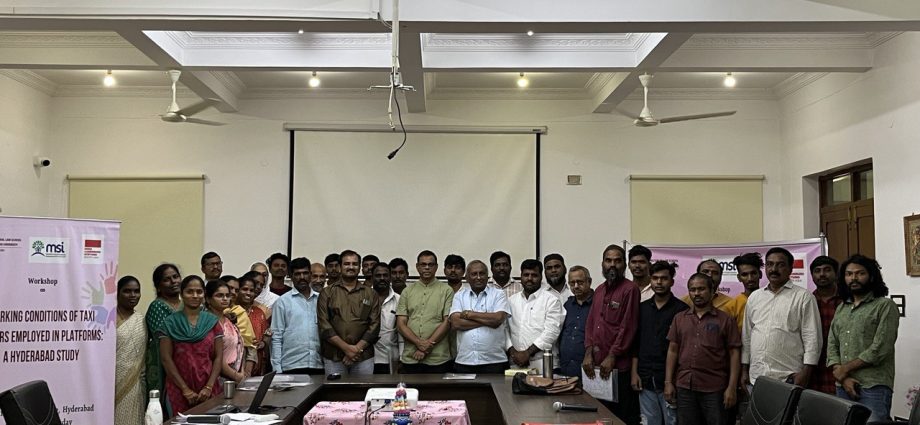By Matters India Reporter
Hyderabad, July 11, 2023: A workshop in the southern Indian city of Hyderabad has asserted the rights and well-being of taxi drivers employed in various platforms
The July 10 workshop, held at the Montfort Social Institute and organized in collaboration with the Bengaluru-based National Law School of India University, addressed various challenges faced by these drivers.
Brother Varghese, director of Montfort Social Institute, described platform work as a new and complex phenomenon for modern civilization. He emphasized the unprecedented situation where employees are uncertain about their employers, the source of their income, and whom to approach in case of issues. He stressed the need to identify and fight for the rights of platform workers, both from the platforms as well as from the government.
Babu Matthew, a speaker at the workshop, emphasized that platforms often employ eloquent language to shift the liability of assets onto the workers. This practice places an immense burden on the drivers, subjecting them to physical, mental, and economic strain.
The workshop was attended by 20 workers representing well-known companies such as Ola, Zomato, Uber, Rapido, and Swiggy. “Their presence lent authenticity to the discussions as they courageously shared their daily struggles and voiced their concerns,” Brother Theckanath said.
Mohan Mani from the Center for Labour Studies at the National Law School of India University presented the findings of a comprehensive study on platform workers in Hyderabad. The report revealed major issues plaguing these workers and their profound implications for their overall well-being.
Janardhan Vellikad from the Department of Sociology at the University of Hyderabad underlined the urgency of recognizing and addressing the challenges faced by platform workers. He highlighted the far-reaching impact on their long-term health and financial well-being.
During the workshop, platform workers shared their daily struggles, providing firsthand accounts of the challenges they face. One recurring concern raised by the drivers was the frequent changes in incentive terms imposed by the companies, leading to confusion and frustration.
Drivers recounted instances where they experienced extended waiting periods of up to five hours without a single trip. Rubina, a participant from an NGO in Hyderabad described the system as one designed to fail, deceive, and exploit hardworking drivers.
The workshop also highlighted the stories of veteran drivers who have worked in the industry since 1999. These experienced drivers explained how they were forced to search for alternative professions because of the current working conditions. The increasing difficulties faced by these drivers underscore the urgency of addressing the systemic challenges faced by platform workers.
Furthermore, participants questioned the widening disparity between the rising cost of living and the decreasing ride fares. Some drivers with over 20 years of experience have resorted to selling tea. Some have sold their cars to become drivers.
The workshop also addressed concerns about the treatment received by drivers from law enforcement authorities. Participants lamented the use of force by the police, suggesting a need for improved communication and a more constructive approach to resolving issues.
The workshop demanded minimum guaranteed earnings on the platform, social security benefits for all its workers, government contribution to social security given workers’ GST payments, transparency in the functioning of the app, accident compensation for both drivers and taxis and legislation covering employment rights.
“The workshop served as a platform to raise awareness and advocate for these demands, urging platform companies, government entities, and relevant authorities to take immediate action. By addressing these demands, we can pave the way towards a fair and equitable working environment that ensures the well-being and rights of platform workers,” Brother Theckanath said.

